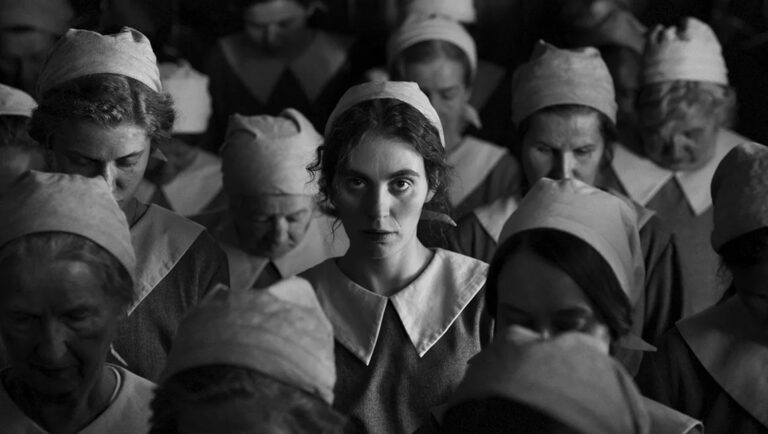The Girl with the Needle, the third feature film by Swedish director Magnus von Horn, wastes no time in announcing to the viewer that it is a serious movie. Shot in crisp black-and-white, Needle opens with a series of closeups of faces, all distorted with filmed images of other faces projected on them. This is a fairly direct formal allusion to Persona, and one of several Bergman citations we will see throughout von Horn’s film. While Bergman is an interesting director for lots of reasons, von Horn harks back to the late ’60s and early ’70s by using Bergman metonymically as a sign of arthouse severity. That is, he is mobilizing a stereotype of Bergman in order to cover his own work in borrowed glory.
The Girl with the Needle is by no means a bad film, but it never exactly earns its self-importance. In many ways, it’s yet another wallow in historic European misery, in the vein of Michael Haneke’s The White Ribbon or Václav Marhoul’s The Painted Bird. But unlike those films, Needle is more than happy to goose its audience with slow, creeping reveals and horror-film music stings, suggesting that for von Horn, this kind of austere anti-humanism is just another genre, its bleak perspective something that can be put on or taken off like a lens filter. All of this makes The Girl with the Needle effective but empty, an exercise in precision that never manages to rise above formal demonstration or make us truly care about its protagonist.
The woman in question is Karolina (Vic Carmen Sonne), a young woman whose husband has gone missing while fighting in World War I. She experiences a rapid slide from the middle class into poverty, struggling to survive by working as a machine operator in a fabric factory. Jørgen (Joachim Fjelstrup), the scion of the aristocratic family that owns the mill, takes a shine to Karolina, having sex with her in an alley and impregnating her. He is weak-willed, but he agrees to marry Karolina until his mother (Benedikte Hansen) threatens to cut him off financially. Karolina, so confident in her impending nuptials, dismisses her husband Peter (Besir Zeciri) when he comes back from the war severely disfigured. So, now having no options, Karolina attempts to give herself a miscarriage, but is stopped by a woman named Dagmar (Trine Dyrholm), who convinces her instead to hand the baby over to her. Dagmar tells Karolina she runs a black-market adoption service and promises the young mother that she will place the child with a good home. “You’ve done the right thing,” she tells Karolina, and every other distressed mother who comes to her for help.
Von Horn depicts the years following the Great War as a nonstop phantasmagoria, defined by cruelty, insanity, and an utter disregard for human life. But the director is also fascinated by cheap, lurid spectacle. When Karolina discovers that Peter has had to take work as a circus freak, Needle places us alongside the crowd, demanding that we gawk at him along with the savages. Similarly, we are subjected to the repeated sight of Karolina being forced to breastfeed Dagmar’s seven-year-old daughter Erena (Ava Knox Martin), as yet another sign of the absolute depravity of this postwar environment. Like Haneke, von Horn plays with the dual morality of exploitation cinema, making us look at wholly unpleasant scenarios while also judging us for choosing to watch.
In addition to conscripting the viewer as an unwitting participant in his judgmental vision, von Horn makes sure that we are always at least a couple of steps ahead of Karolina. Many of Needle’s most significant plot points hinge on the protagonist being, if not outright dumb, then at least conveniently incurious. This is the sort of film that sets its characters up to be unconscionably naïve, only to frame their moral failings as an indictment of their bodily and financial precarity. In this sense, The Girl with the Needle exhibits a very conservative undercurrent, implying that circumstance may make people do desperate things, but it also ruins them so completely as to make them beyond saving. The fact that this film hovers around the question of abortion but never exactly tackles it only makes matters worse. Von Horn mistakes this muddle for complexity, the profound moral ambiguity of serious European cinema. In reality, The Girl with the Needle just traffics in whataboutism, insisting that there is always a greater evil hiding just around the corner.
DIRECTOR: Magnus von Horn; CAST: Vic Carmen Sonne, Trini Dyrholm, Besir Zeciri, Joachim Fjelstrup; DISTRIBUTOR: MUBI; IN THEATERS: December 6; RUNTIME: 1 hr. 55 min.


Comments are closed.